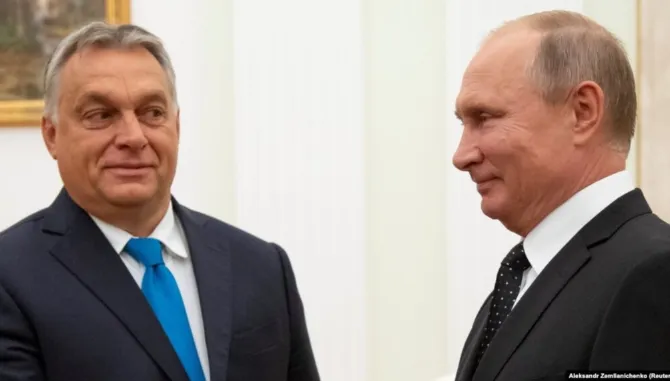-
CENTRES
Progammes & Centres
Location
Despite being an active EU member, Hungary intends to continue its existing cooperation with Russia.

As the Russia-Ukraine conflict nears its second anniversary, the European Union (EU) has blocked Russia’s access to European markets, while supplying Kiev with military and financial aid. However, the recent meeting between Russian President Vladimir Putin and Hungarian Prime Minister Victor Orbán in Beijing held on 17 October—the 13th meeting between the two leaders since 2009—indicates that the anti-Russian sentiment has few takers in Budapest.
Both leaders were among the 28 heads of state attending the third Belt and Road Forum initiative. This meeting between the two heads was held to discuss Hungary’s continued access to Russian energy. Putin stated that despite the current “geopolitical circumstances”, Russia and Hungary have maintained good bilateral relations. Putin asserted that both nations had different positions on global issues which makes the dialogue more valuable. Orbán, on the other hand, emphasised its existing cooperation with Russia and noted that Hungary will salvage what it can in the current sanctions regime.
Victor Orbán was the only other European head of state, along with the Serbian President Aleksandar Vučić, to attend the BRI programme. It is also worth noting that Orbán skipped the EU summit which was set to discuss the Israel-Hamas war—as Hungary is an all-weather ally of Israel. More often than not, Hungary breaks the EU consensus on Israel by favouring Israel's stance. Instead, the Hungarian Foreign Minister, Péter Szijjártó attended the summit. In the aftermath of the meeting in Beijing, the ambassadors of NATO countries and Sweden came to Budapest, to discuss the actions of an EU country’s prime minister for not complying with the EU. On 26 October, Orbán went on to justify his actions by claiming that he was proud of meeting Putin, as he believed in a “strategy for peace”, which requires open communication.
Victor Orbán was the only other European head of state, along with the Serbian President Aleksandar Vučić, to attend the BRI programme.
However, the meeting is not surprising since Russian energy firms renew their agreements every year with Hungary. The energy component in Russia-Hungary relations has been a major factor since communist times. Russian energy firms significantly influence the Hungarian energy markets. Hungary receives Russian oil through the Druzhba pipeline, and gas through the TurkStream pipeline and its branches through Bulgaria and Serbia. Rosatom—a Russian state-owned company—built the Paks nuclear reactor that generates half of all the electricity in the country and sells nuclear fuel to Budapest.
While other European countries have diversified their oil imports away from Russia, Hungary still imports over 60 percent of its oil needs from Russia. As Orbán reiterated, Russian Export Blend (REB) is difficult to replace as sourcing suppliers is a tedious task that requires an overhaul of the current oil infrastructure. In 2022, 80 percent of natural gas and 65% of oil came from Russia. Such ties have been prevalent since communist times, and have not been delinked since.
This explains Hungary’s catch-22 situation. Due to its geographical proximity to Russia and its dependence on the Russian energy value chains, Hungarian oil and gas companies source their hydrocarbon needs from Russia. A sudden disruption of supply would result in Hungarians freezing this winter. Even if the MOL Group and MVM Energy—major energy players in Hungary—decide to import oil and gas from elsewhere, it would take more than two years to switch to different forms of crude oil as it requires millions in investment to switch from the REB. Even if one presents the case for Hungary to import non-Russian liquefied natural gas (LNG) the global demand for LNG has skyrocketed since the Russia-Ukraine war began. Qatar, the world’s largest exporter of LNG, has no spare capacity until 2027. Giving no choice to a landlocked Hungary except to continue purchasing oil and gas from Russia.
Furthermore, Hungary is involved in the transhipment of Russian oil to Serbia. Hungary’s MOL Group and Serbia’s pipeline operator Transnefta are building a 128-kilometre connector to link their respective oil trunk pipeline network. Hungary’s MVM and Serbia’s gas player Serbiagas are creating a joint regional natural gas trading venture, thus, it is unlikely that Hungary to sever its energy ties with Russia anytime soon. This energy dependence has impacted Budapest’s behavior in the EU as well when earlier this year, Hungary demanded an exemption for Russian oil transported through pipelines in the sixth round of EU sanctions. Overall the meeting between Orbán and Putin is not merely an attempt to cozy up to Putin, but also a way for Hungary to assert itself and carve out its foreign policy towards Russia, one that is different from the EU stance. At the same time, Orbán omitted the word “special” and termed the Russia-Ukraine war as a “military operation” to maintain a balanced position, whilst condemning Russia’s special operation. Further, to not cross the red line, Orbán emphasized that under no circumstance, Hungary would participate in supplying Ukraine with military goods.
Furthermore, Hungary is involved in the transhipment of Russian oil to Serbia. Hungary’s MOL Group and Serbia’s pipeline operator Transnefta are building a 128-kilometre connector to link their respective oil trunk pipeline network.
Orbán has not always had a pro-Russian stance. Before coming to power in 2010, Orbán condemned Russia for its involvement in the Georgian War in 2008 and warned of Hungary’s energy dependence on Russia. Yet, in recent years, Zsuzsanna Szelényi, a former member of Fidez describes, that Orbán has introduced a tap-dance brand politics, through which Budapest exploits its position in the EU while maintaining strong ties with Moscow In the not-too-distant past, the European Commission criticised Orban's perspectives and the illiberal judicial decisions in Hungary, leading to the withholding of nearly 22 billion euros in cohesion funds by the EU. These funds are designed to help the less developed EU nations bridge their investment gap and improve their infrastructure. To unlock a part of these funds—13 billion euros— Budapest enacted judicial reforms this May. The EU parliament requires the support of Hungary in releasing funds to Kiev, and therefore, the EU has no choice but to appease Orbán by unfreezing the funds.
Hence, employing a political manoeuvring strategy, Orbán condemns the invasion while also acting as a disruptor at the EU level. As for Putin, the bonhomie with Orbán plays right into his hands by exposing the EU’s disunity and cracks in the Western alliance’s support for Ukraine.
Rajoli Siddharth is an intern with the Strategic Studies Programme at the Observer Research Foundation
The views expressed above belong to the author(s). ORF research and analyses now available on Telegram! Click here to access our curated content — blogs, longforms and interviews.

Rajoli Siddharth Jayaprakash is a Junior Fellow with the ORF Strategic Studies programme, focusing on Russia’s foreign policy and economy, and India-Russia relations. Siddharth is a ...
Read More +